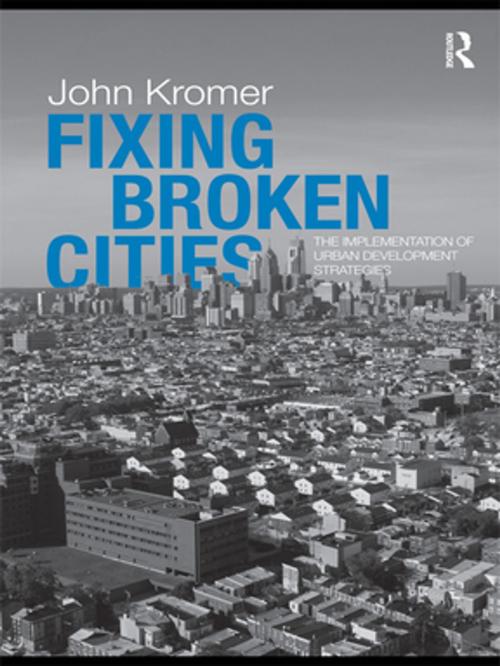Fixing Broken Cities
The Implementation of Urban Development Strategies
Nonfiction, Social & Cultural Studies, Social Science, Sociology, Urban, Political Science, Government, Public Policy| Author: | John Kromer | ISBN: | 9781135967130 |
| Publisher: | Taylor and Francis | Publication: | September 10, 2009 |
| Imprint: | Routledge | Language: | English |
| Author: | John Kromer |
| ISBN: | 9781135967130 |
| Publisher: | Taylor and Francis |
| Publication: | September 10, 2009 |
| Imprint: | Routledge |
| Language: | English |
Through the insightful lens of an experienced practitioner, this book describes the origin, execution, and impact of urban repopulation strategies—initiatives designed to attract residents, businesses, jobs, shoppers, and visitors to places that had undergone decades of decline and abandonment. The central question throughout the strategies explored in the book is who should benefit? Who should benefit from the allocation of scarce public capital? Who should enjoy the social benefits of urban development? And who will populate redeveloped areas? Kromer provides realistic guidance about how to move forward with strategic choices that have to be made in pursuing the best opportunities available within highly disadvantaged, resource-starved urban areas. Each of the cases presents strategies that are strongly influenced by geography, economics, politics, and individual leadership, but they address key issues that are major concerns everywhere: enlivening downtowns, stabilizing and strengthening neighborhoods, eliminating industrial-age blight, and providing quality public education options.
Through the insightful lens of an experienced practitioner, this book describes the origin, execution, and impact of urban repopulation strategies—initiatives designed to attract residents, businesses, jobs, shoppers, and visitors to places that had undergone decades of decline and abandonment. The central question throughout the strategies explored in the book is who should benefit? Who should benefit from the allocation of scarce public capital? Who should enjoy the social benefits of urban development? And who will populate redeveloped areas? Kromer provides realistic guidance about how to move forward with strategic choices that have to be made in pursuing the best opportunities available within highly disadvantaged, resource-starved urban areas. Each of the cases presents strategies that are strongly influenced by geography, economics, politics, and individual leadership, but they address key issues that are major concerns everywhere: enlivening downtowns, stabilizing and strengthening neighborhoods, eliminating industrial-age blight, and providing quality public education options.















